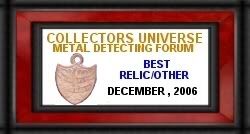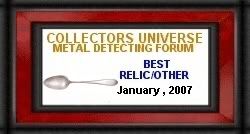Sanborn fire insurance maps.
Anyone every use them?
I have been referencing them online for sometime now and must say they are an excellent research tool!
I used these maps to help find the homesites in the local park that I found the Masonic Penny recently.
To quote from one of their sites...
<< <i>The Sanborn Map Collection consists of a uniform series of large-scale detailed maps, dating from 1867 through 1969 and depicting the commercial, industrial, and residential sections of cities. The maps were designed by surveyer D.A. Sanborn in 1866 to assist fire insurance agents in determining the degree of hazard associated with a particular property. The D.A. Sanborn Co. was the first company to offer insurance maps on a national scale in response to the growth of urban communities after 1850. The company's surveyors meticulously documented the structural evidence of urbanization-building by building, block by block, neighborhood, neighborhood. >>
<< <i>Sanborn Maps illustrate in outline form the site, size, shape, construction and building material of dwellings, commercial buildings, and factories. Details of buildings include fire walls, the location and number of windows and doors, style and composition of roofs, wall thickness, cracks in exterior walls, and makes of elevators. The maps also indicate building use, sidewalk and street widths, layout and names, property boundaries, distance between buildings, house and block numbers, location of water mains, hydrants, piping, wells, cisterns, and fuel storage tanks. >>
I access them at the Ohio Public Library Information Network. OPLIN You will need a library card from Ohio(obviously) to gain access.
Digital Sanborn Map info.
Digital Sanborn Maps, 1867-1970 are provided to academic and public libraries. So folks from other states may be able to access the maps at their local library or a similar online site like OPLIN.
So if you get a chance, check them out!
HH and Happy Researching!
I have been referencing them online for sometime now and must say they are an excellent research tool!
I used these maps to help find the homesites in the local park that I found the Masonic Penny recently.
To quote from one of their sites...
<< <i>The Sanborn Map Collection consists of a uniform series of large-scale detailed maps, dating from 1867 through 1969 and depicting the commercial, industrial, and residential sections of cities. The maps were designed by surveyer D.A. Sanborn in 1866 to assist fire insurance agents in determining the degree of hazard associated with a particular property. The D.A. Sanborn Co. was the first company to offer insurance maps on a national scale in response to the growth of urban communities after 1850. The company's surveyors meticulously documented the structural evidence of urbanization-building by building, block by block, neighborhood, neighborhood. >>
<< <i>Sanborn Maps illustrate in outline form the site, size, shape, construction and building material of dwellings, commercial buildings, and factories. Details of buildings include fire walls, the location and number of windows and doors, style and composition of roofs, wall thickness, cracks in exterior walls, and makes of elevators. The maps also indicate building use, sidewalk and street widths, layout and names, property boundaries, distance between buildings, house and block numbers, location of water mains, hydrants, piping, wells, cisterns, and fuel storage tanks. >>
I access them at the Ohio Public Library Information Network. OPLIN You will need a library card from Ohio(obviously) to gain access.
Digital Sanborn Map info.
Digital Sanborn Maps, 1867-1970 are provided to academic and public libraries. So folks from other states may be able to access the maps at their local library or a similar online site like OPLIN.
So if you get a chance, check them out!
HH and Happy Researching!
Analog Rules! Knobs and Switches are cool!




0
Comments
Unfortunately, they stay in the Special Collections Room, and there's no chance of taking them home and browsing through them, despite the fact that my father is the Director of the entire library system in seven SE Georgia counties, including this one (the flagship branch).
What's cool about the maps is that they literally used cut and paste to update them... cut out pieces of paper and glued them on!
The books are impossibly huge to carry around, so even if they did circulate through the library, (via reprints of course), they'd have to be bound in smaller volumes.
I wonder if such modern reprints exist. I'll bet they do.
Collector since 1976. On the CU forums here since 2001.
Ours will sell plat maps on CD for $5.00 a CD. I have maps from back to 1911 all the way into the 50's on three CDs. Easy way to track how a city develops. I used them for a project other than detecting, but they would be a great tool.
<< <i>You can also check with your local city and planning office.
Ours will sell plat maps on CD for $5.00 a CD. I have maps from back to 1911 all the way into the 50's on three CDs. Easy way to track how a city develops. I used them for a project other than detecting, but they would be a great tool. >>
Interesting idea. I wonder if our town does it on CD. I'll bet they do, since all the current info is available online. I'd like to see the old info.
<< <i>Hey lord.. what I do in situations similiar to yours is take digital photos of the areas that interest me. That way I can look at them anytime. >>
Collector since 1976. On the CU forums here since 2001.
Our town is currently a sneeze over 50K in pop. The maps cover the entire town. Don't know if the info would be be as readily availible in a larger city.
"our main library has what is called the "california room". they have those maps. they are quite bulky, but they can be scanned. i know of some guys who have lamenated copies. very handy to have while driving around town. "
Our main library has an "Iowa room" that has the Sanborn maps, etc. They are bulky and you can't take them with you. The CDs on the other hand are great because I can punch them up on my laptop and print out any portion I want. At $5.00 each, they are worth it. I really don't know if this is common practice or not for most cities but would be worth a phone call or email to the planning and zoning office.
<< <i>How small (population) of a city do these map cover? >>
I looked up my old home town which had a population of 2,200 in the mid 1980's.
There were several listed for it.
<< <i>
<< <i>How small (population) of a city do these map cover? >>
I looked up my old home town which had a population of 2,200 in the mid 1980's.
There were several listed for it. >>
Then I see these maps very useful. I was concerned they were for fairly large cites, say 50,000+ populations. I'll need to get to the library soon.
1. 7-17-81 Warrenton GC Driver 310 yards 7th Hole (Par 4)
2. 5-22-99 Warrenton GC 6 iron 189 yards 10th Hole
3. 7-23-99 Oak Meadow CC 5 iron 180 yards 17th Hole
4. 9-19-99 Country Lake GC 6 iron 164 yards 15th Hole
5. 8-30-09 Country Lake GC Driver 258 yards 17th Hole (Par 4)
Collector of Barber Halves, Commems, MS64FBL Frankies, Full Step Jeffersons & Mint state Washington Quarters
Plus, they can tell you if you are excavating a benzene repository.
NAT
Kiss me twice.....let's party.